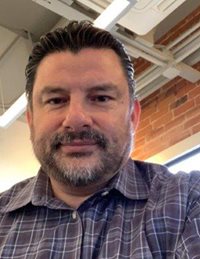Growing a Career in Food Logistics
 Steve Schult
Steve Schult
Vice President of Global Supply Chain, Blue Diamond Growers
Steve Schult knew that he needed a master’s degree to advance his career in logistics. He joined the online Master of Supply Chain Transportation & Logistics’ first cohort and completed the program while working for food startups in the San Francisco Bay Area. Today, as vice president of global supply chain for Blue Diamond Growers, Steve manages a supply chain responsible for more than 3,000 grower members of the Blue Diamond Almond Cooperative.
“The program changed my career trajectory and opened a lot of doors,” Steve said.
Learn how the online Master of Supply Chain Transportation & Logistics program expanded Steve’s supply chain knowledge and put him on the path to success.
Could you tell us a bit about your background?
I started my career in the U.S. Coast Guard and then worked for a third-party logistics provider. When I realized I wanted to move vertically, my boss told me to pick an industry: food, automotive or technology. I chose food because I love food and the food industry is always growing. I never looked back and have been working in food supply chain for more than 25 years. I’ve worked on mergers and acquisitions as well as logistics and corporate planning for large brands, family-owned companies and startups.
Why did you decide to do this program?
I recognized that to stay competitive and grow my career; I needed to expand my horizons with education. After I found out about this program, I spent some time researching it and talking to the faculty. The program and the material really resonated with me.
What did you like about the online Master of Supply Chain Transportation & Logistics program?
The program is very practical and relates to the real-life supply chain world. I appreciated learning the theoretical concepts and how to apply models. Today, I use the lessons I learned in the program to make business decisions and complete projects like inventory modeling.
How else has this program affected your career?
My roles have progressed as a result of earning this master's degree. While I was in the program, I was the director of distribution at a startup. Another startup called me up and was impressed that I was enrolled in the program and hired me as the director of their total supply chain. Then, a senior director role came along as the next opportunity. This program helped me so much throughout my career that I've kept in touch and am willing to give back as much as possible.
How do you keep in touch with the program?
I talk with the faculty and read about the University of Washington’s research on drones, food delivery systems and last-mile delivery. I have also spent two years mentoring students in the program. I'm currently mentoring a student who is very early in her career. I offer her advice on her capstone project and career.
Being VP of Global Supply Chain for Blue Diamond Growers is a huge role. Are there other things you would like to do in the supply chain world?
Later in my career and into retirement, I see myself becoming a mentor or teacher. In addition to mentoring, I’ve guest-lectured and taught a few courses related to supply chain, transportation and logistics at some universities. This program helped me gain the practical and theoretical knowledge I needed to become a subject matter expert.
Do you have any advice for prospective students?
Don’t rule out the program because it's not in your backyard or because you’re from a different discipline. I lived in the San Francisco Bay Area when I was in the program and I always felt like I was a part of the team. The faculty and community are there to support you. Also, the program creates a solid foundation in supply chain, and so don’t be scared off if you have limited experience and exposure to supply chain.
Do you have any advice for people considering supply chain as a career?
Last year, when I told people I worked in supply chain, they would ask, “What is that?” Today, it’s more recognized. It's how we're feeding the world, making vaccines and helping everything move. I encourage you to look at how supply chain folks are at the heart of keeping the world in good, running order so that we all can continue to prosper.